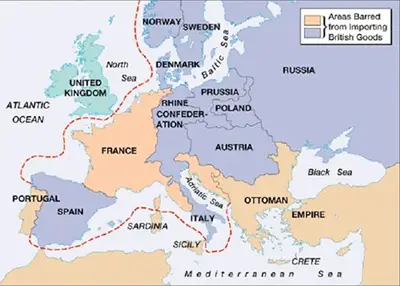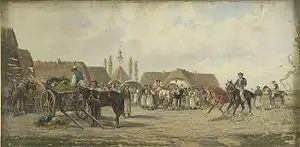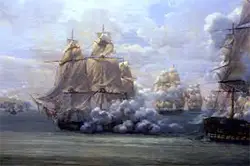The Continental System
The Continental System was a commercial and economic war fought against the United Kingdom, driven by the French Empire under Napoleon Bonaparte, and prosecuted by nearly the entirety of the rest of Europe. 
Bonaparte announced the Systéme continental in the Berlin Decree, issued in that city on Nov. 21, 1806. French troops had routed Prussian troops in a quick series of battles after a French invasion across the Rhine in September, as part of the War of the Fourth Coalition, and then occupied the Prussian capital. The aim of the Continental System (also known as the Blocus continental or Continental Blockade) was to try to gain some advantage over the U.K., which still ruled the seas after winning the Battle of the Trafalgar in October 1805 and was still financing many of the Allied war efforts on the Continent. All trade with the U.K. was banned. Even the mail could not be delivered. France had declared embargoes on British trade before, under the Directory, in October 1796 and January 1798. The result then was a strengthening of the British naval blockade of French ports. The same had happened again: After Trafalgar, the U.K. again declared a blockade of all French coastline and had the ships to enforce it. The creation of the Continental System resulted in much the same response from the U.K. (which had transformed from Great Britain in the Act of Union 1800). The London In principle, the Continental System governed the French Empire and all of its holdings, beginning with the Berlin Decree and continuing with the expansion of the borders of not only France itself but also the lands controlled by French troops. This included all or areas of Germany, Italy, the Netherlands, Poland, and Switzerland. Significantly, the Treaty of Tilsit, which was signed in July 1807 and effectively ended the War of the Fourth Coalition by removing Prussia and Russia from the war, required Russia to join the Continental System. In practice, the French governmental apparatus did not always have enough manpower to police the ports and shipping lanes of the Atlantic, Baltic, and Mediterranean. Smuggling was rampant. Initially, some countries tried to circumvent the system by having their ships fly an "acceptable" flag, even though the goods on those ships were bound to and/or from "enemy" countries. Occupied lands employed this practice on both sides of what was essentially a France–U.K. divide. As well, the more French troops were needed to fight battles on the Continent, the fewer French men and money were available to act not only as customs surveillance but also as customs administrators. The opposite was true in the relatively rare months during the existence of the Continental System in which France was not at war. The System did change trade practices, in both the U.K. and on the Continent. France and other Continental powers had to find other sources of cotton, wool, textiles, and other goods that they were used to importing from the U.K. An alternative market was the United States, which was at war with the U.K. in 1812–1814. However, ships from both France and the U.K. at this time took to seizing American ships just as readily as ships from other countries and so the American market was not as much of a savior as it could have been, especially because before and after that war, American ships were still in the habit of sailing to and from U.K. ports. One exception to this was the American Embargo Act of 1807, which decreed that the U.S. would not trade with either France or U.K.; this resulted in a much bigger hit to U.K. imports than to French imports, but it still hurt both countries. (The U.S. revoked the embargo in 1809.) The U.K. was also in the midst of the Industrial Revolution during this time. Technological innovations drove increases in production across many industries. The U.K. was ahead of other countries in this. The Continental System was effective in hurting the U.K. economically. A reduction in demand for U.K.-produced goods in Europe led to a decrease in wages in the U.K. and, after a few years, led to many bankruptcies. Prices on some goods skyrocketed. A succession of bad harvests in the U.K. led to starvation for many and economic hardship for many more. Despite the advances in technology, people still needed to eat and to earn money in order to live. It was not only the poor who were affected: The rich noticed a distinct lack of availability of luxury goods that had once come from the Continent. At the same time, however, the blockade meant that goods produced in the U.K. were not making their way to the Continent. At that time, people in Europe depended largely on imports, primarily from the U.K., for things like cocoa, coffee, sugar, and tobacco. More importantly, cotton, which was in high demand, was off the economic table as well. 
At this time in history, the methods of transport for goods were on roads, up and down rivers and cross lakes, and through oceans and seas. With seaborne shipping closed to Continental Europe, many industries suffered from lagging transport times, as goods that had formally been stacked onto ships and had arrived at their destination in a number of days instead were loaded onto wagons or small boats and driven over roads or along internal waterways and took weeks to arrive. The U.K., on the other hand, could still benefit from overseas trade and began to rely more heavily on markets in India and South America. In times of economic uncertainty, people often blame the government, whatever or whoever it is; this was certainly the case in France during the Revolution, as Bonaparte well knew. It was also the case under the Continental System, as people living in occupied lands began to chafe against French rule. As well, because shipbuilding was still a major business, France and its dependents suffered a sharp decrease in demand for all facets of that industry. The U.K., by contrast, carried on building, repairing, and sailing ships because it still had overseas trading partners. Bonaparte eased a number of restrictions at one point, in order to try to ease some of the shortages. This worked for a time but benefited the U.K. much more than it did France and so he tightened things up again. After a time, Russia refused to remain in the Continental System. That was one of a number of factors that led to the Moscow Campaign of 1812. As well, Portugal proved all too ready to continue trading with the U.K., and France decided to send troops into Spain and then Portugal in order to stop that trade. French troops became embroiled in a civil war that came to be called the Iberian Campaign. Europe was at peace for no more than half of the seven years of the existence of the Continental System, and that peace was sporadic. Therefore, efforts to achieve stability of trade within the Continental System were not as effective as they could have been, if France had had time to develop a consistent system of trade administration. In the end, the Continental System hurt France and its dependents more than it hurt the U.K., not so much because of the loss of goods made in the U.K. as because of the loss of trade outside the Continent. With an increasing lack of cooperation, the Continental System proved too difficult to administer successfully. The longer the Napoleonic Wars progressed, the more the Allies won key battles and the more client nations refused to remain in the Continental System. When Bonaparte abdicated in 1814, the Continental System ceased to exist. |
|
Social Studies for Kids
copyright 2002–2024
David White



 government in 1807 issued a series of Orders in Council that beefed up that blockade and took things one step further, requiring any ships flying a neutral flag (meaning not one from either France or the U.K.) to report to a U.K. report for inspection and for payment of dues and licensing fees. France countered with the Milan Decrees in late 1807 that gave French ships the power to declaring that any ships that satisfied the U.K.'s new port conditions could be classified as enemy ships and, therefore, permissible to capture.
government in 1807 issued a series of Orders in Council that beefed up that blockade and took things one step further, requiring any ships flying a neutral flag (meaning not one from either France or the U.K.) to report to a U.K. report for inspection and for payment of dues and licensing fees. France countered with the Milan Decrees in late 1807 that gave French ships the power to declaring that any ships that satisfied the U.K.'s new port conditions could be classified as enemy ships and, therefore, permissible to capture.
